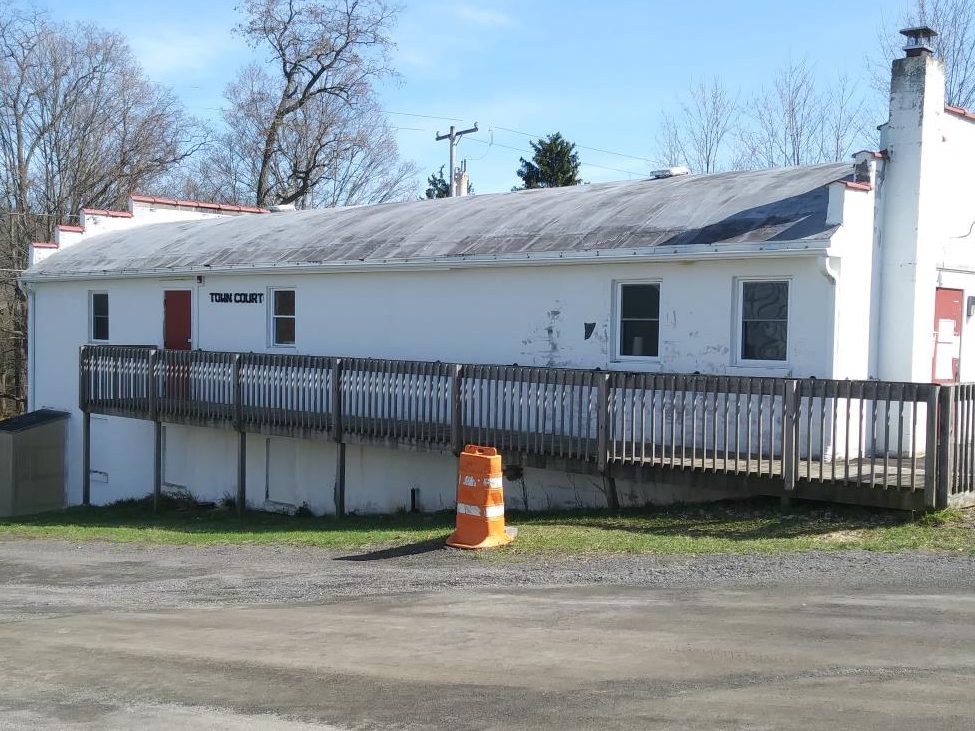N. Applegate Road fire claims life of Enfield woman
Reported by: Jeff Murray, The Ithaca Journal; December 30, 2019
A Tompkins County woman is dead following a house fire Saturday afternoon (Dec. 28th) in the Town of Enfield.
Firefighters from the Enfield Volunteer Fire Co. and several other departments, along with state troopers, responded around 12:40 p.m. to 244 North Applegate Road in Enfield, according to New York State Police.
A neighbor called 911 to report the fire but didn’t know if anyone was inside the house at the time, state police said. The first trooper who arrived on the scene observed heavy flames and smoke coming from the residence. The trooper tried to enter the residence but could not enter safely, according to state police.
Enfield firefighters battled the blaze and later located the body of 72-year old Helen L. Freelove inside.
Investigators from the New York State Office of Fire Prevention and the New York State Police Forensic Identification Unit responded to the scene.
Troopers were also assisted by New York State Park Police, Trumansburg Village Police and New York State Environmental Conservation Police.
Freelove was taken to Lourdes Hospital where an autopsy will be performed.
At this time, no determination has been made about the cause of the fire and it remains an open investigation, state police said.
Enfield got mutual aid on the scene from the Trumansburg, Mecklenburg, Newfield and Ithaca fire departments.
###
Key County Committee Chair backs Enfield Sheriff’s Substation
by Robert Lynch, December 19, 2019
Prospects brightened Thursday (Dec. 19th) for Tompkins County helping fund conversion of a portion of Enfield’s Old Highway Barn to house a Sheriff’s Satellite Substation.
“It’s a reasonable expense for tangible benefits,” Chair Rich John (D-Ithaca) told the Tompkins County Legislature’s Public Safety Committee. John’s endorsement could encourage his committee—and then the full County Legislature—to provide the matching funds Enfield’s Town Board has requested to update heating equipment in that portion of the aging highway garage that deputies would occupy.

Enfield Supervisor Beth McGee and her husband, Darren, first proposed in September that the Sheriff establish a part-time Enfield outpost so as to better serve Enfield and its adjacent towns. McGee’s Town Board in November authorized setting aside one of the garage’s five bays, plus a small office and a restroom for the Sheriff’s use.
The Board’s November action, however, also resolved that “the Town Board will request a one-half cost share from the Tompkins County Legislature for energy-efficient heating/cooling equipment and installation.”
But when Public Safety Committee members reviewed that latter provision in late-November, and lacking specifics as to the project’s extent or cost, they and other legislators balked.
“I didn’t know that it was going to cost the County anything,” Legislature Chair Martha Robertson said of the Satellite Substation at the time.
Thursday’s Committee atmosphere, however, proved different. Chair John touted the potential benefits of the satellite office, saying it could save deputies serving the County’s western areas as much as 45 minutes travel time at the beginning and end of their shifts.
“It warrants working with the Town of Enfield,” the Committee Chair concluded.
Supervisor McGee, in attendance Thursday, but not last month, regretted that there’d been “some misinformation,” given the Board resolution’s generality. McGee indicated the work for which the Board requested County assistance was limited to replacement of “very old baseboard heaters” in the office and restroom, possibly with a modern heat pump.
McGee told the Committee she’d return next month with a “better idea of the cost.”
The Satellite Substation proposal, enthusiastically endorsed by County Sheriff Derek Osborne, would quarter two deputies and their patrol car at the Enfield location part-time. The Sheriff has predicted the satellite should shorten response time to Enfield emergencies.
As authorized by the Enfield Board, the Town could terminate the agreement should it determine the arrangement proves not in the public’s best interest.
###
Enfield Comprehensive Plan receives warm review on a snowy night
by Robert Lynch, December 18, 2019
Maybe it’s just that good, hard work takes time to complete.
A Town of Enfield Comprehensive Plan, the better part of a decade in the drafting, finally reached its Public Hearing before the Town Board Wednesday night (Dec. 18th). Snow squalls and slippery roads may have kept some people away. But so may have the lack of controversy.
Approximately ten people addressed the 20-minute Town-sponsored Hearing. All comments were brief, informal, and positive. At least half those speaking were either incumbent Town Board members or those who will shortly assume Town office.
“I agree with everything here,” said Joe Dawson, a “resident member” of the Town’s Comprehensive Plan Committee, a citizen group that assisted Enfield’s Town and Planning Boards in scripting the 131-page document. It would replace a prior Comprehensive Plan adopted in 2001.
“I’m bummed that I’m not going to vote on this,” quipped departing Town Board member Becky Sims, for whom Wednesday’s meeting was her last.
“I’m really proud of what’s come together,” observed Sims, who said she first got involved with the Comprehensive Plan in 2014, commenting she’s seen it as a tool to enforce Enfield’s fracking ban.
“We’ve arguably gathered more input on this than on anything else,” Sims added.
Even though the Town Board has spent little meeting time in recent months discussing the Comprehensive Plan, Supervisor Beth McGee counted as many as 41 prior meetings where residents and officials discussed and drafted its contents.
The draft’s introductory language credits a 2012-2013 Resident Survey as laying the groundwork for its many recommendations. That survey and its analysis constitute much of the draft’s latter pages. Purportedly back then, some 182 (nearly 20 per cent) of the circulated surveys were returned. Despite the nearly seven years since the survey’s completion, those responsible never chose to update the 2013 findings.
Agreeing with Sims, several at the Hearing stressed the Comprehensive Plan’s importance in controlling fracking and other types of unwanted development. It moves us “from what we don’t want to what we do want,” said Councilperson Mimi Mehaffey.
In numerous paragraphs, the Draft Comprehensive Plan professes that Enfield residents prefer to “maintain the Town’s rural character,” rather than opt for expansive growth.
“To that end, development should be discouraged that would damage air and water quality, increase noise levels, worsen pollution, create traffic problems, adversely affect Enfield visually, or otherwise degrade the Town’s rural character,” the Plan states.
The Draft Comprehensive Plan would also “maintain the ban on gas drilling activities,” and also limit the “high density of development.”
“The Town of Enfield is clear that it values its rural character and natural resources; it does not welcome heavy industry,” the Plan’s infrastructure section asserts.
The Draft Plan does, however, encourage the build-out of cellular and Internet services. It advocates road maintenance agreements to preserve Town roadways, and encourages the Town to “pursue the development of a new municipal administrative facility,” presumably including a new Town Hall. Board members have cooled to the Town Hall idea in recent years.
Supervisor McGee said Wednesday that the next step after the Hearing will be to “scope” the Comprehensive Plan’s Environmental Impact Statement. McGee predicted the Town Board could possibly adopt the Comprehensive Plan by late-February.
Though the Plan’s authors credit their work product as a “vision” statement, seeking to guide Enfield’s future until 2050, those authors also cautioned that their work is “intended to be a living document and may grow and change as local conditions change.”
If that’s true, the planners’ work might never end. They recommend review of data—maybe the Plan’s revision—after the 2020 Census.
###
Enfield Town Board adopts Wind Law as departing members bid farewell
by Robert Lynch, December 12, 2019
At exactly eight minutes past Seven, on the night of the 11th of December, five members of Enfield’s Town Board collectively, yet quietly, heaved a sigh of relief: They’d placed their Town’s much-discussed, long-delayed, and highly controversial new Wind Law on the books.

One supporter in the audience clapped briefly, perhaps expecting a round of applause that never followed. No, to those on the Board, this was a burden removed; a mission accomplished; a cloud lifted that some saw as having hung over the Town not just during the past 29 months of a Wind Moratorium; but reaching back much farther, to the debates over the ill-fated, ultimately abandoned, Black Oak Wind Farm.
No one expected anything other than the unanimous approval the 61-page, 23,000-word Wind Law received. The Board did not disappoint. Prior to the anticlimactic 5-0 vote, Supervisor Beth McGee offered a brief, prepared statement applauding both the law and the process which produced it.
McGee brought visual aids. Addressing those who complain the law is too voluminous, the Supervisor compared on her desk the Wind Law’s mere three score of pages to the three bound and wrapped reams of documents—purportedly more than 1,400 pages in total—that comprised Black Oak’s Environmental Impact Statement, a tome that she said she’d plowed through when she first joined the Board. The comparison may be unfair. Yet for the Supervisor, it made her point.
The Black Oak controversy stood clearly in the minds of both those who voted for the law and for the Town residents who observed the moment.
This was “not a kneejerk operation,” Councilperson Michael Carpenter said of the law. We were “looking at the facts,” we took the time and drafted a law that was “fair and equitable for everybody in this Town.” Carpenter will retire from the Board at month’s end.
Speaking of the process from Black Oak forward, Carpenter observed, this was “Participatory Democracy.” There may have been “lots of raised voices,” yet the public’s involvement was “something really positive that’s happened,” he concluded.
In recent months, much of Enfield’s citizen involvement, expressed at two Public Hearings, came from residents living near the Black Oak Wind Farm’s original site, most comments highly supportive of the new law. Resident remarks prior to Wednesday’s vote focused more on commending Board members for their diligence, rather than addressing the law itself.

One supporter, Marcus Gingerich, a member of the Renewable Energy Advisory Committee, which scripted much the law’s language, took issue with critics—which include Tompkins County’s Department of Planning and Sustainability—who assert that the law’s stringent property line setback requirements equate to an “effective ban” on commercial wind power in Enfield. Gingerich cited recent reports from both Chautauqua County, New York and Marion County, Kansas to buttress his claim that the law would not preclude wind development.
But Theresa Guler’s comment proved more typical. “Thanks for all your hard work… thanks for the night meetings” said the Black Oak Road resident, one of the Town’s more passionate supporters of wind regulation.
The Wind Law, first drafted by the Advisory Committee and then scrutinized line-by-line at a half-dozen Town Board review sessions this summer and fall, imposes tighter regulations on commercial wind farms and on smaller, home-based turbines. Commercial operators would face the tightest controls, including stringent setbacks, sound constraints and limits on visual pollution, including so-called “shadow flicker.” The law will subject homeowner turbines to height and setback limits as well, and establish comparable lot line sound restrictions during the devices’ operation.
A November first letter from Katherine Borgella, Tompkins County’s Commissioner of Planning and Sustainability, had faulted the draft Wind Law’s restrictiveness and advanced ten key “Recommendations” for revision. On most items, the Town Board by supermajority votes overrode the Planning Department’s enforcement power.
Though some may conclude the Advisory Committee has finished its work, Jude Lemke, a key Committee advocate of wind regulation, disagrees. After the meeting, Lemke said her committee must remain poised should a commercial wind developer approach the Town, a prospect she believes remains possible, despite the new, tight controls.
Wednesday marked the final Regular Town Board meeting for both Councilperson Carpenter and his colleague, two-year Councilperson incumbent Becky Sims, as well as for Town Clerk Alice Linton, who will retire at year’s end following a decade of service in her position. Stephanie Redmond and Robert Lynch (this writer) will replace Carpenter and Sims January first. Ellen Woods will become Town Clerk.
“Some say government service is a thankless job. That’s not the case,” remarked Sims, who’s made it clear she’s stepping aside to devote more time to her family. Sims also noted that she first met Town Clerk Linton when she and her betrothed husband applied for their marriage license.
“She took the time to welcome us to the community,” Sims said of Linton. “I appreciate her quality of work and her knowledge of the Town.”
###
Enfield Board drops petitioning requirement as it adopts speed limit policy
by Robert Lynch, December 12, 2019
To paraphrase an old sexist cliché: “It’s a Supervisor’s Prerogative to Change her Mind;” in this case, at mid-meeting.
Wednesday (December 11th), Enfield Supervisor Beth McGee presented her Town Board a draft Speed Limit Policy. Among its provisions, the draft policy, written by the Supervisor, contained a requirement that speed limit reductions—ultimately the decision of the State—would be considered upon “a written request and a petition.” Such a petition would require signatures from “at least 65% of residents living on the road named in the request.”
Under the controlling provisions of the New York State Traffic Law, speed reduction requests, once acted upon by the Town Board, would then go to the County Superintendent of Highways, and then to the State Department of Transportation. The County would perform a traffic study. The State would render the final decision.
However, the 65 per cent petitioning requirement was to be a Town-mandated threshold. But as the Town Board commenced its discussion, McGee backed off.
“At first I thought the 65 per cent requirement was a good idea,” the Supervisor said. “But now I’ve changed my mind.”
Although initially cautious, McGee’s colleagues agreed. They unanimously adopted the Speed Limit Policy without the petitioning requirement. They acted even though the newly-released policy was not listed on the meeting’s Agenda as a “Potential Action Item.” Customarily, the Town Board holds non-emergency items for at least a few weeks before adoption to encourage public comment.
At its November 13th meeting, a Hayts Road resident, Cathy Rogers, approached the Town Board urging safety improvements—including a lower speed limit—for her stretch of highway, where a pedestrian had been hit and killed by a car in August 2018. The Board took no immediate action on Rogers’ request. But her appeal prompted a brief Board discussion of Town procedure for making speed limit changes.
Board members Wednesday saw abandoning a petitioning requirement as an incentive to encourage individual—or small group—appeals for speed limit reductions.
“Why no petitioning?” asked Councilperson Mimi Mehaffey.
“I’d thought the 65 per cent would be a democratic process,” answered McGee. But on further thought, she acknowledged, any recommended reduction is a county decision, anyway.
Councilperson Michael Carpenter said he thought a petition requirement was a bad idea.
Carpenter’s colleague, Councilperson Becky Sims, suggested a minimum signature requirement might hold merit. “I think it’s good to have some ‘buy-in,’” Sims said.
Though stripping away the petitioning requirement, Board members suggested petition signatures might still hold value in persuading Town, County, or State officials to institute the changes residents seek.
###

